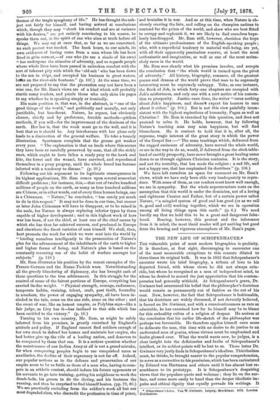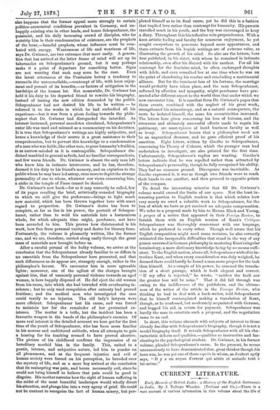THE NEW LIFE OF SCHOPENHAUER.*
THE vulnerable point of most modern biographies is prolixity. It is therefore, at first sight, discouraging to encounter one of the most memorable exceptions to this censure dilated to three times its original bulk. It was in 1862 that Schopenhauer's executor wrote his brief biography, a tribute of love to his departed friend, with whose views he did not always coin- cide, but whom he recognised as a man of independent mind, to whom he desired to accord the just appreciation that his contem- poraries had generally withheld. At Schopenhauer's grave, Dr. Gwinner had announced his belief that the philosopher's doctrines would remain as permanently out of fashion as the cut of his coat. Now, however, the fact that Schopenhauer is fashionable, that his doctrines are widely discussed, if not devoutly believed, is forced on Dr. Gwinner, and with a conscientiousness as rare as admirable, be has examined how far he himself may be to blame for this unhealthy cultus of a religion of despair. He arrives at the conclusion that his earlier life-sketch of the philosopher was perhaps too favourable. He therefore applies himself once more to delineate the man, this time with no desire to do justice to an underrated man of genius, whose virtues must be emphasised and faults glossed over. What the world wants now, he judges, is a clear insight into the deficiencies and faults of Schopenhauer's intellect, or its noblest points will be lost to us. These latter Dr. Gwinner very justly finds in Schopenhauer's idealism. This idealism must, he thinks, be brought nearer to the popular comprehension, to serve as a corrective to his pessimism, which has been caricatured by Eduard von Hartmann and others until it has almost lost re- semblance to its prototype. It is Schopenhauer's despairing views that the populace quote and welcome ; they lie on the sur- face, and come more easily to hand than the deeper idealistic im- pulse and ethical dignity that equally pervade his writings. It • Schopenhauer's &ben. Von W. Gwinner. Leipzig: Brockhane. 1878. London Kolckmann. also happens that the former appeal more strongly to certain politico-economical conditions prevalent in Germany, and un- happily existing also in other lands, and hence Schopenhauer, the pessimist, and his daily increasing crowd of disciples, who far outstrip him in their condemnation of existence, are the prophets of the hour,—baneful prophets, whose influence must be com- bated with energy. Wantonness of life and weariness of life, says Dr. Gwinner, are two extremes that meet easily. A genera- tion that has arrived at the latter frame of mind will set up its tabernacles on Schopenhauer's ground, but it may perhaps mire it a point of departure for something better. Signs are not wanting that such may soon be the case. Even the latest utterances of the Pessimists betray a tendency to reconcile the unreconcilable,—contempt of life, with keen enjoy- ment and pursuit of its benefits,—as factors of mitigation in the hardships of the human lot. But meanwhile, Dr. Gwinner has held it his duty to his departed friend to rewrite his biography, instead of issuing the new edition demanded by the public. Schopenhauer had not desired his life to be written — he referred it to the works in which he had embodied all his experience—but it was from a pious feeling towards the philo- sopher that Dr. Gwinner had disregarded the interdict. As interest increased, personal anecdotes circulated, Schopenhauer's outer life was used and misused as a commentary on his doctrines. It is true that Schopenhauer's writings are highly subjective, and hence a knowledge of their source is a great assistance to their comprehension, but to pervert this knowledge to a condemnation of a man who was liable, like other men, to poor humanity's frailties, is as narrow-minded as it is contemptible. Schopenhauer dis- dained mankind in general as fools, had no familiar correspondents, and few warm friends. Dr. Gwinner is almost the only man left
who knew him in intimate intercourse, and he has, therefore, -deemed it his duty to his friend's memory, and an expiation to the public whom he may have led astray, once more to depict the strange personality of one to whom, whatever our views concerning him, a niche in the temple of Fame cannot be denied.
Dr. Gwinner's new book—for so it may correctly be called, few of its pages recalling the brief, artistically-rounded biography to which we still give the preference—brings to light much new material, which has been thrown together here with scant regard to proportion. Dr. Gwinner's desire has been to complete, as far as lies in his power, the portrait of Schopen- hauer, rather than to weld his materials into a harmonious whole, for which adequate time might, perchance, not have been accorded to him. This proves how disinterested is his work, how free from personal vanity and desire for literary fame. Fortunately, the volume is pleasantly written, like the former one, and we are, therefore, carried along easily through the great mass of materials now brought before us.
After a careful perusal of the bulky volume, we arrive at the -conclusion that the Schopenhauer already familiar to us differs in no essentials from the Schopenhauer here presented, and that such differences as do appear are, strangely enough, rather in the philosopher's favour. We encounter him in more agreeable lights ; moreover, one of the ugliest of the charges brought against him, that of unseemly personal violence towards an aged woman, is here happily disposed of. He did eject the old woman from his room, into which she had intruded with overbearing in- solence; but he only used compulsion after entreaty had proved fruitless ; and the medical men who investigated the case could testify to no injuries. The old lady's lawyers were more efficient. Schopenhauer lost his cause, and was forced to maintain her for the remainder of her protracted ex- istence. The matter is a trifle, but the incident has been a favourite weapon in the hands of the philosopher's enemies. Of more real interest is the detailed account we here get for the first time of the youth of Schopenhauer, who has been more familiar in his morose and embittered solitude, when all attempts to gain a hearing for his teaching seemed to have proved abortive. The picture of his childhood confirms the impression of an hereditary morbid bias in the family. This, united to a poetic, intense, and subjective nature, led him to ponder on all phenomena, and as the frequent injustice and evil of human society were forced on his perception, he brooded over the mystery of life, and as a mere boy arrived at the conclusion that its mainspring was pain, and hence necessarily evil, since he could not bring himself to believe that pain could be good in disguise. His mother narrates how the sight of human suffering in the midst of the most beautiful landscapes would wholly divert his attention, and plunge him into a very agony of grief. He could not be content to recognise the fact of human misery, but per- plexed himself as to its final cause, yet he did this in a fashion that implied love rather than contempt for humanity. His parents travelled much in his youth, and the boy was encouraged to keep a diary. Throughout this his reflective vein preponderates. With a keen artistic feeling and faculty for sensuous enjoyment, he yet sought everywhere to penetrate beyond mere appearances, and these extracts from his boyish writings are of extreme value, as illustrating the growth of his mind. So also are the letters, here first published, to his sister, with whom he remained in intimate relationship, even after his discord with his mother. For all his contempt for the feminine mind, he often exchanged thoughts with Adele, and even consulted her at one time when he was on the point of abandoning his resolve and concluding a matrimonial alliance. But for the imminent loss of his fortune, the marriage would probably have taken place, and the man Schopenhauer, softened by affection and sympathy, might perchance have pre- sented a far different aspect to the world than that under which we now encounter him. It is manifest from Dr. Gwinner's pages that these events, combined with the neglect of his great work, strengthened his misanthropy, and as a natural consequence, the more he isolated himself, the more his eccentricities increased. The letters here given concerning his loss of fortune, and the strenuous and ultimately successful efforts made to regain his patrimony, are masterpieces of lucid business faculty as well as irony. Schopenhauer boasts that a philosopher need not be an unpractical dreamer, and be gave efficient proof of his assertion. Eight letters, written by Goethe to Schopenhauer, concerning his Theory of Colours, which the younger man had undertaken to investigate, are also printed for the first time. Unfortunately, Schopenhauer's replies are wanting. Goethe's letters indicate that he was repelled rather than attracted by Schopenhauer's personality, though he fully recognised his ability. They had no common ground. Divergence was inevitable. As Goethe expressed it, it was as though two friends were to reach their hands to one another, and then proceed to opposite points of the compass.
To detail the interesting minutim that fill Dr. Gwinner's volume would exceed the limits of our space. Not the least in- teresting portion to English readers is that which relates how very nearly we owed a valuable work to Schopenhauer, for tho loss of which we have as yet received no adequate compensation. We refer, to a proposal made by him to Messrs. Black and Young,
propos of a notice that appeared in their Foreign Review, to furnish them with an English version of Kant's Critique. Schopenhauer was thoroughly conversant with our language, which he preferred to every other. Though well aware that his English composition might need some revision, he also correctly estimated the insuperable difficulties that stand in the way of any person unversed in German philosophy in mastering Kan t'ssingular terminology, a mere dictionary knowledge being by no means suffi- cient. To the English nation, above all, Schopenhauer wished to in- troduce Kant, and when every consideration was duly weighed, he deemed there could hardly be found a man more proper for the task than himself. As a sample of his power, he annexed the transla- tion of a short passage, which is both elegant and correct. "If my offer is rejected," he wrote, "neither the fault nor the greater loss will be mine." That it did fall through was owing to the indifference of the publishers, and the obtuse- ness of the writer of the article in the Foreign Review, who thinking he had to deal with a back-writer, told Schopenhauer that he himself contemplated making a translation of Kant, though, as he confessed, but moderately acquainted with German, and begged his aid, in return for payment. Schopenhauer was hardly the man to entertain such a proposal, and the negotiation came to an end.
In short, this volume abounds with subjects of interest to those already familiar with Schopenhauer's biography, though it is not a model biography itself. It reveals Schopenhauer with all his cha- racteristic defects and qualities,—qualities so instructive and fas- cinating to the psychological student. Dr. Gwinner, in his former volume, pleaded Schopenhauer's cause. In the present, he seems unconsciously to have demonstrated that, great thinker though his hero was, he was yet one of those esprits in whom, as Joubert aptly says, "II y a un noyau d'erreur qui attire et assimile tout k lui-meme."



































 Previous page
Previous page